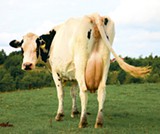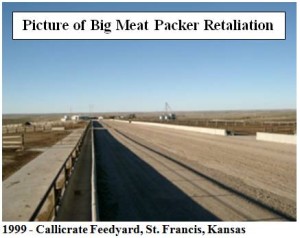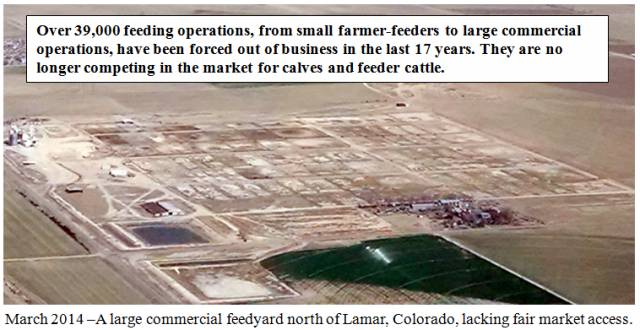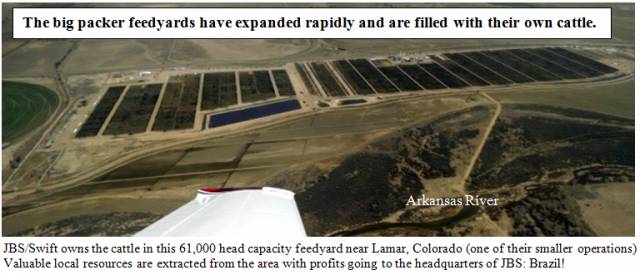
Special Commission Appointed to Investigate Packers Makes Report
DeClare the Five Big Packers Control One-Half of Meat Supply of Allied Nations-Have Used Their Power to Manipulate Livestock Market
President Wilson has made public the recently filed report of the special commission appointed some time ago to investigate the alleged monopolistic control of the meat industry by the big packing companies. The commission declares that the five big packers control half of the meat supply of the allied nations and that the power of the companies has been used to manipulate the live stock market, restrict food supplies and nationally and internationally, control the price of meats and meat substitutes, defraud both consumers and producers of food, destroy competition in buying and selling of meat secure special privileges from rail roads and municipalities and make unwarranted profits.
The five packing companies thus referred to are Swift & Co., Armour & Co., and Cudshy company, Wilson & Co. and Morris & Co.
The commission makes the following recommendations to the president:
Government Take Charge
First – that the government acquire, through the railroad administration, all rolling stock used for the transportation of meat animals and that such ownership be declared a government monopoly.
Second – that the government acquire, through the railroad administration, the principal and necessary stockyards of the country to be treated as freight depots and to be operated under such conditions as will insure open, competitive markets, with uniform scale of charges for all services performed, and the acquisition or establishment of such additional yards from time to time as the development of live stock production may require. This to include customary adjuncts to stockyards.
Third – that the government acquire, through the railroad administration, all privately owned refrigerator cars and all necessary equipment for their proper operation and that such ownership be declared a government monopoly.
Fourth – that the federal government acquire such of the branch houses, cold storage plants and warehouses as are necessary to provide facilities for competitive marketing and storage of food products in the principal centers of distribution and consumption. The same to be operated by the government as public markets and storage places under such conditions as will afford an outlet for all manufacturers and handlers of food products on equal terms. Supplementing the marketing and storage facilities thus acquired the federal government establish through the railroad administration at the terminals of all principal points of distribution and consumption, central wholesale markets and storage plants with facilities open to all upon payment of just and fair charges.”
“Out of the mass of information in our hands” the report continues, “the one fact stands out with all possible emphasis. The small dominant group of American meat packers are now international in their activities, while remaining American in their identity. Blame which now attaches to them for their practices abroad as well as at home inevitably will attach to our country if the practices continue.”
The commission says the five packing companies either separately or jointly own or control more than half of the export meat production of the Argentine, Brazil and Uruguay and have investments in other surplus producing countries, including Australia as well as branches in Great Britain, France, Italy, Germany, Canada, Denmark and Paraguay.
Control Meat for Allies
“Under present shipping conditions”, the report adds, “the big American packers control more than half of the meat upon which the allies are dependent.
Of the difficulties which the packers threw into the way of the commission’s investigations, headed by Francis J. Heney, the report says:
“The commission thru Mr. Heney had to meet deliberate falsification of returns properly required under legal authority; we had to meet schools for witnesses where the employees were coached in anticipation of their being called to testify in an investigation ordered by you (the president) and by the congress of the United States.”
The commission reports that the packers not only control the meat supply but a “countless number of by-products industries” and have invaded allied industries and even un-related ones. This control has extended now to the principal substitutes for meat, such as eggs cheese and vegetable oil products, the commission says and rapidly is being extended to cover fish and nearly every kind of foodstuff.
After detailing the control of the five companies over the meat and allied industries the commission says this control rests in the hands of a small group of individuals: J. Ogden Armour, the Swift Brothers, Morris brothers, Thomas E. Wilson, acting under the veto of a group of bankers including the Chase National bank, Guaranty Trust company, Kuhn, Leob & Co. William Salomon & Co, and Hallgarten & Co all of New York and the Cudahys.
The commission says through the control of Wilson & CO., Inc. three of the most powerful banking groups in the country are “participating in the rapidly maturing food monopoly.” This participation of the bankers in the packing industry, it says was not at all displeasing to the big packers of J. Ogdon Armour and Louis F. Swift were consulted during the negotiations looking to acquisition of an interest in the industry by the bankers.
A Family Affair
“The menace of this concentrated control of the nation’s food,” says the report, “is increased by the fact that these five corporations and their five hundred and odd subsidiary, controlled and affiliated companies are bound together by joint ownerships, agreements, understandings, communities of interest and family relationships.”
In detailing how the packers are alleged to have gained control of the meat supply of the United States and the allies the commission said:
“The Armour, Swift, Morris and Wilson interest have centered into a combination with certain foreign corporations by which export shipments of beef, mutton, and other meats from the principal South American meat-producing counties are apportioned among the several companies on the basis of agreed percentages. In conjunction with this conspiracy, meetings are held for the purpose of securing the maintenance of the agreement and making such readjustments as from time to time may be desirable. The agreements restrict South American shipments to European countries and the United States.
“Since the meat supplies of North and South America constitute practically the only source from which the United States and her allies can satisfy their needs for the armies, navies, and civil populations, these two agreements constitute a conspiracy on the part of the big five, in conjunction with certain foreign corporations, to monopolize an essential part of the food of the United States, England, France, and Italy.”
Packers Object to the Plan
Protests against the recommendations of the federal trade commission that the government assume control of the packing industry were made by some of the heads of concerns involved.
J. Odgen Armour, president of Armour & Co., after pointing out that the government had been in control of the packing industry since November 1, 1917, said that the statement made by him at the beginning of the war, that “the United States government can save Armour & Co. and every employee and official thereof, if need be,” was reiterated “a thousand times more emphatically.”
Thomas E. Wilson, president of Wilson & Co., said that if any new methods for the benefit of the public can be worked out, “we will welcome them and co-operate to the fullest extent.”
Edward J. Morris, jr., for Morris & Co., issued the following:
“I have not seen the report but from what I can learn the idea of the federal commission is to turn the entire stock yards and packing industry over to the railroad administration.
“The main object now is “the winning of the war” and we know of no institution that has played as important a part and with profits limited to 2 1-2 cents on the dollar for business done, or a total of not over 9 per cent for the year. One the capital invested I cannot see where conditions would be improved.
“We believe that any one familiar with the situation would agree that the packing industry is the one industry that has performed its services with 100 per cent efficiency. This applies to the feeding of the army and all our allies, besides taking care of the civil population.
“Food products are now being handled by the packers to the entire satisfaction of the army, navy and our allies. Why try an experiment at this critical time?”
Louis F. Swift, president of Swift & Co, issued the following statement:
“We naturally do not like to be publicly charged with unlawful methods of gaining monopoly control when we know that we are in open and honest competition with every other packer. The report apparently tries to prove that the packers have obtained a monopolistic control through the ownership of live stock and refrigerator cars, stock yards and branch houses, and advocates that the government acquire these facilities.
“Swift & Co. is perfectly willing to let the railroad administration decide whether it shall take over our live stock and refrigerator cards. The principal thing to consider is whether the present services could be improved. The only reason we build our own refrigerator cars was that the railroads did not want to furnish the equipment.
“The stockyards are already being regulated by the United States department of agriculture, and we have no objection to the government’s taking them over completely if it sees fit to do so. We wish to point out, however, that our company has become interested in stockyards only for the purpose of providing proper market facilities that did not otherwise exist and that in such stockyards there are open competitive markets with uniform and reasonable charges for services performed. It is difficult to see how the public could be benefited by such action: in fact, quite the opposite effect might occur.
“We do not believe that taking over branch houses and storage houses would be practicable, as it would destroy personal initiative in handling of a highly perishable product, where great skill, acquired only by long experience, is necessary. It would also be a risky experiment in government operation that would be of doubtful benefit, even if successful and would undoubtedly react unfavorably on live stock values.
“No one is more interested in improving conditions in the live stock and meat trades than we are, and we are willing to cooperate with the government in any practical constructive plan.” – The Idaho Farmer.
Original Article: The Farmers Union: Special Commission Makes Reporton Packers 1918







 click to enlarge
click to enlarge











